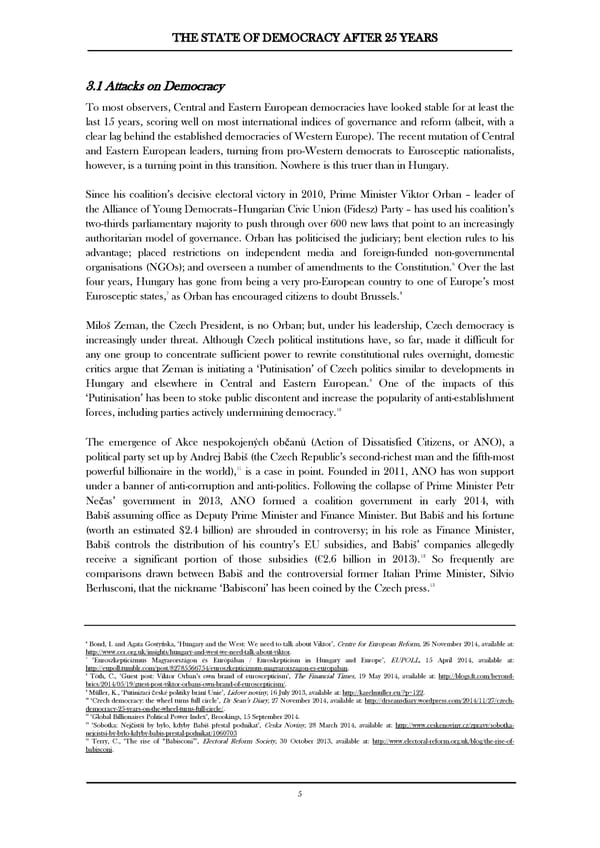THE STATE OF DEMOCRACY AFTER 25 YEARS 3.1 Attacks on Democracy To most observers, Central and Eastern European democracies have looked stable for at least the last 15 years, scoring well on most international indices of governance and reform (albeit, with a clear lag behind the established democracies of Western Europe). The recent mutation of Central and Eastern European leaders, turning from pro-Western democrats to Eurosceptic nationalists, however, is a turning point in this transition. Nowhere is this truer than in Hungary. Since his coalition’s decisive electoral victory in 2010, Prime Minister Viktor Orban – leader of the Alliance of Young Democrats–Hungarian Civic Union (Fidesz) Party – has used his coalition’s two-thirds parliamentary majority to push through over 600 new laws that point to an increasingly authoritarian model of governance. Orban has politicised the judiciary; bent election rules to his advantage; placed restrictions on independent media and foreign-funded non-governmental organisations (NGOs); and overseen a number of amendments to the Constitution.6 Over the last four years, Hungary has gone from being a very pro-European country to one of Europe’s most Eurosceptic states,7 as Orban has encouraged citizens to doubt Brussels.8 Miloš Zeman, the Czech President, is no Orban; but, under his leadership, Czech democracy is increasingly under threat. Although Czech political institutions have, so far, made it difficult for any one group to concentrate sufficient power to rewrite constitutional rules overnight, domestic critics argue that Zeman is initiating a ‘Putinisation’ of Czech politics similar to developments in Hungary and elsewhere in Central and Eastern European.9 One of the impacts of this ‘Putinisation’ has been to stoke public discontent and increase the popularity of anti-establishment forces, including parties actively undermining democracy.10 The emergence of Akce nespokojených obþanĤ (Action of Dissatisfied Citizens, or ANO), a political party set up by Andrej Babiš (the Czech Republic’s second-richest man and the fifth-most powerful billionaire in the world),11 is a case in point. Founded in 2011, ANO has won support under a banner of anti-corruption and anti-politics. Following the collapse of Prime Minister Petr Neþas’ government in 2013, ANO formed a coalition government in early 2014, with Babiš assuming office as Deputy Prime Minister and Finance Minister. But Babiš and his fortune (worth an estimated $2.4 billion) are shrouded in controversy; in his role as Finance Minister, Babiš controls the distribution of his country’s EU subsidies, and Babiš’ companies allegedly 12 receive a significant portion of those subsidies (€2.6 billion in 2013). So frequently are comparisons drawn between Babiš and the controversial former Italian Prime Minister, Silvio 13 Berlusconi, that the nickname ‘Babisconi’ has been coined by the Czech press. 6 Bond, I. and Agata GostyĔska, ‘Hungary and the West: We need to talk about Viktor’, Centre for European Reform, 26 November 2014, available at: http://www.cer.org.uk/insights/hungary-and-west-we-need-talk-about-viktor. 7 ‘Euroszkepticizmus Magyarországon és Európában / Euroskepticism in Hungary and Europe’, EUPOLL, 15 April 2014, available at: http://eupoll.tumblr.com/post/82785566754/euroszkepticizmus-magyarorszagon-es-europaban. 8 Tóth, C., ‘Guest post: Viktor Orban’s own brand of euroscepticism’, The Financial Times, 19 May 2014, available at: http://blogs.ft.com/beyond- brics/2014/05/19/guest-post-viktor-orbans-own-brand-of-euroscepticism/. 9 Müller, K., ‘Putinizaci þeské politiky brání Unie’, Lidové noviny, 16 July 2013, available at: http://karelmuller.eu/?p=122. 10 ‘Czech democracy: the wheel turns full circle’, Dr Sean’s Diary, 27 November 2014, available at: http://drseansdiary.wordpress.com/2014/11/27/czech- democracy-25-years-on-the-wheel-turns-full-circle/. 11 ‘Global Billionaires Political Power Index’, Brookings, 15 September 2014. 12 ‘Sobotka: Nejþistší by bylo, kdyby Babiš pĜestal podnikat’, Ceska Noviny, 28 March 2014, available at: http://www.ceskenoviny.cz/zpravy/sobotka- nejcistsi-by-bylo-kdyby-babis-prestal-podnikat/1060703 13 Terry, C., ‘The rise of “Babisconi”’, Electoral Reform Society, 30 October 2013, available at: http://www.electoral-reform.org.uk/blog/the-rise-of- babisconi. 5
 The State of Democracy After 25 Years Page 5 Page 7
The State of Democracy After 25 Years Page 5 Page 7